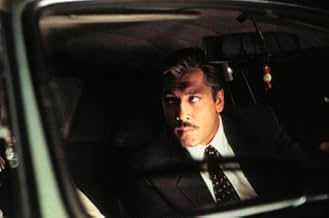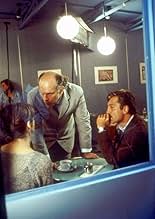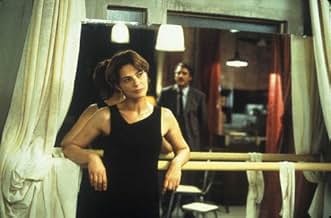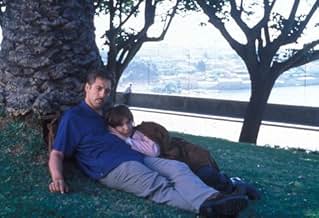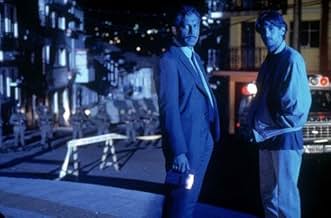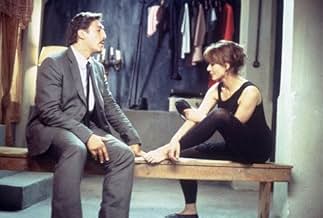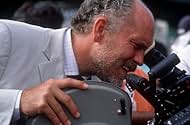A police detective in a South American country is dedicated to hunting down a revolutionary guerilla leader.A police detective in a South American country is dedicated to hunting down a revolutionary guerilla leader.A police detective in a South American country is dedicated to hunting down a revolutionary guerilla leader.
- Awards
- 1 win & 3 nominations
Storyline
Did you know
- TriviaThe story is inspired by the Maoist insurgency in Peru known as the Shining Path. Its leader Abimael Guzmán, who was known by the nom de guerre President Gonzalo, was captured in an apartment above a ballet studio in the capital city of Lima in 1992. The ballet teacher Yolanda was based on Maritza Garrido Lecca, the woman in whose apartment Guzmán was found. Bardem's character was inspired by Benedicto Jimenez and Gen. Antonio Ketin Vidal, the leading figures responsible for Guzmán's capture.
- GoofsWhen Sucre & Llosa arrest the young woman in orange, she has been handcuffed to the ceiling of the car. But then en route, soldiers simply drag her out of the backseat. No handcuff keys. No bolt cutters.
- Quotes
Agustín Rejas: I'd like to have a list of staff with access to the President's chambers.
Calderón: Luckily there are only two of them. The first is named 'Fuck', the second is named 'Off'.
- Crazy creditsThe producers would like to thank ... the residents of Narcisos Street ...
- ConnectionsFeatured in Revealing 'the Dancer Upstairs' (2003)
- SoundtracksViagens Interditas
(1995)
Written by Pedro Malgheas (as Pedro Ayres) and Rodrigo Leão
Performed by Madredeus
Licensed by Dpte. de Productos Especiales de
(p) EMI Odean, S.A., Madrid, Spain, 2001 exclusive rights holder
Featured review
Actor John Malkovich makes an auspicious directorial debut with `The Dancer Upstairs,' an intriguing, if not altogether satisfying, police procedural set in an unnamed Latin American country.
Javier Bardem (`Night Must Fall') gives a richly textured performance as Detective Augustin Rejas, a man of principle and ethics operating in a world of corruption and violence. Rejas finds himself embroiled in a life-and-death mystery when he investigates an underground terrorist organization that is targeting key government officials for assassination. Who these people are is not at all clear to those in charge and even their motives can only be guessed at. As Rejas studies the clues in search of answers, he becomes drawn to a beautiful young dance teacher with whom he establishes a platonic yet highly charged romantic relationship. It is in the bringing together of these two seemingly disparate plot lines that the movie fails, ultimately, to satisfy. For roughly the first three quarters of the film, as Rejas collects his evidence and unravels the puzzle, we gladly go along where the filmmakers are taking us, fascinated by the setting, the atmosphere and the contemporary relevance of the terrorism theme. But when, towards the end, the story kicks into high tragedy mode, the movie loses us, partly because the plotting itself is not particularly credible and partly because the relationship between Rejas and the woman has not been sufficiently developed to achieve the status of genuine tragedy. The film is much better when it sticks to the business of the case and leaves all the existential navel-gazing out of the mix.
This is not to demean either the moving, beautifully modulated performance of Bardem or the stark, self-assured direction of Malkovich, who shows he knows how to function as well behind the camera as he does in front. True, the film is a trifle slow at times but this just shows that Malkovich will not be rushed when the material itself demands deliberation and care. Although the movie is about a half hour too long, real languor begins to set in only during the final stretches. Until then, `The Dancer Upstairs' makes for rewarding viewing.
Javier Bardem (`Night Must Fall') gives a richly textured performance as Detective Augustin Rejas, a man of principle and ethics operating in a world of corruption and violence. Rejas finds himself embroiled in a life-and-death mystery when he investigates an underground terrorist organization that is targeting key government officials for assassination. Who these people are is not at all clear to those in charge and even their motives can only be guessed at. As Rejas studies the clues in search of answers, he becomes drawn to a beautiful young dance teacher with whom he establishes a platonic yet highly charged romantic relationship. It is in the bringing together of these two seemingly disparate plot lines that the movie fails, ultimately, to satisfy. For roughly the first three quarters of the film, as Rejas collects his evidence and unravels the puzzle, we gladly go along where the filmmakers are taking us, fascinated by the setting, the atmosphere and the contemporary relevance of the terrorism theme. But when, towards the end, the story kicks into high tragedy mode, the movie loses us, partly because the plotting itself is not particularly credible and partly because the relationship between Rejas and the woman has not been sufficiently developed to achieve the status of genuine tragedy. The film is much better when it sticks to the business of the case and leaves all the existential navel-gazing out of the mix.
This is not to demean either the moving, beautifully modulated performance of Bardem or the stark, self-assured direction of Malkovich, who shows he knows how to function as well behind the camera as he does in front. True, the film is a trifle slow at times but this just shows that Malkovich will not be rushed when the material itself demands deliberation and care. Although the movie is about a half hour too long, real languor begins to set in only during the final stretches. Until then, `The Dancer Upstairs' makes for rewarding viewing.
- How long is The Dancer Upstairs?Powered by Alexa
Details
Box office
- Gross US & Canada
- $2,377,348
- Opening weekend US & Canada
- $106,142
- May 4, 2003
- Gross worldwide
- $5,227,348
- Runtime2 hours 12 minutes
- Color
- Sound mix
- Aspect ratio
- 1.85 : 1
Contribute to this page
Suggest an edit or add missing content




